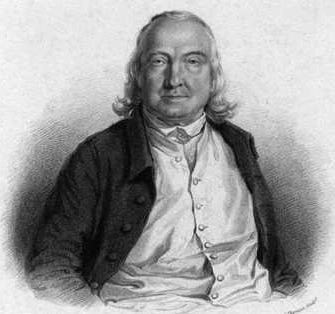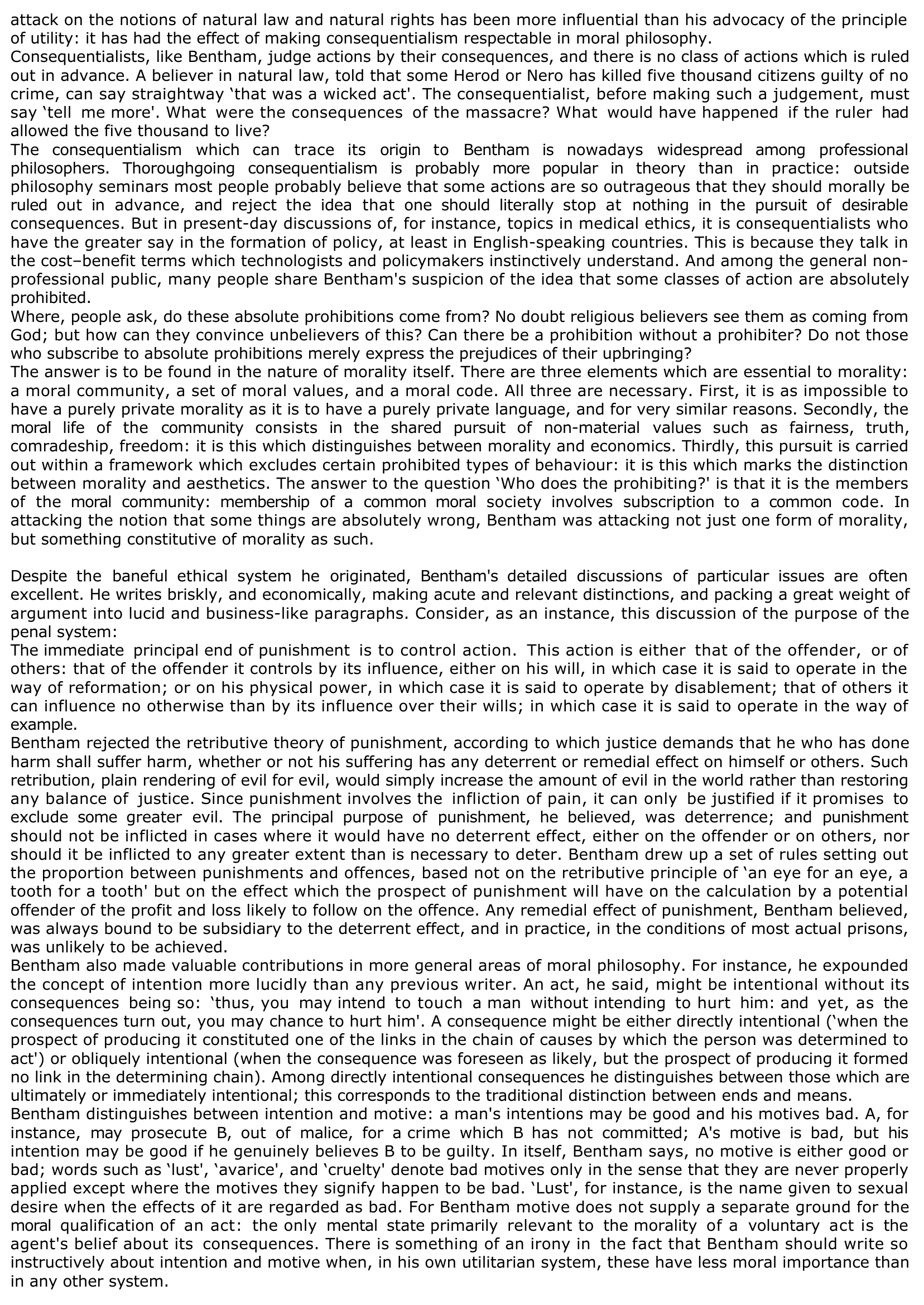Encyclopedia of Philosophy: Jeremy Bentham
Publié le 09/01/2010

Extrait du document

Britain survived the Napoleonic era without invasion and without revolution. Government remained in the hands of a privileged group, and in times of national crisis under Prime Ministers such as the younger Pitt and Lord Liverpool, who were highly autocratic; there was a long way yet to go before the country became a modern democracy. Reform was achieved, but in slow and constitutional stages, rather than by violent upheaval or dramatic coup d'état. One of those who did most to make British public opinion aware of the need for reform was Jeremy Bentham, an Oxford-educated lawyer who in the year of the French Revolution, at the age of forty-one, published an Introduction to the Principles of Morals and Legislation. He had already, in 1776, published an anonymous attack on the English legal system as recently presented in Sir William Blackstone's commentaries. He was much interested in penal reform, and on a visit to Russia he had conceived the idea of a model prison, the Panopticon. William Pitt's government passed an Act of Parliament authorizing the scheme, but it was defeated by ducal landowners who did not want a prison near their London estates. In 1808 he became friends with James Mill and shared in the education of his young son John Stuart. He wrote many papers on legal and constitutional matters, most of which remained unpublished in his lifetime, and spent years on the preparation of a constitutional code, which was unfinished when he died. In 1817 he published a plan for parliamentary reform, followed by a draft Radical Reform Bill. He died in 1832 a few weeks after the Great Reform Bill had been passed, widely extending the parliamentary franchise. His body is preserved in the library of University College, London, which he helped to found.

«
attack on the notions of natural law and natural rights has been more influential than his advocacy of the principleof utility: it has had the effect of making consequentialism respectable in moral philosophy.Consequentialists, like Bentham, judge actions by their consequences, and there is no class of actions which is ruledout in advance.
A believer in natural law, told that some Herod or Nero has killed five thousand citizens guilty of nocrime, can say straightway ‘that was a wicked act'.
The consequentialist, before making such a judgement, mustsay ‘tell me more'.
What were the consequences of the massacre? What would have happened if the ruler hadallowed the five thousand to live?The consequentialism which can trace its origin to Bentham is nowadays widespread among professionalphilosophers.
Thoroughgoing consequentialism is probably more popular in theory than in practice: outsidephilosophy seminars most people probably believe that some actions are so outrageous that they should morally beruled out in advance, and reject the idea that one should literally stop at nothing in the pursuit of desirableconsequences.
But in present-day discussions of, for instance, topics in medical ethics, it is consequentialists whohave the greater say in the formation of policy, at least in English-speaking countries.
This is because they talk inthe cost–benefit terms which technologists and policymakers instinctively understand.
And among the general non-professional public, many people share Bentham's suspicion of the idea that some classes of action are absolutelyprohibited.Where, people ask, do these absolute prohibitions come from? No doubt religious believers see them as coming fromGod; but how can they convince unbelievers of this? Can there be a prohibition without a prohibiter? Do not thosewho subscribe to absolute prohibitions merely express the prejudices of their upbringing?The answer is to be found in the nature of morality itself.
There are three elements which are essential to morality:a moral community, a set of moral values, and a moral code.
All three are necessary.
First, it is as impossible tohave a purely private morality as it is to have a purely private language, and for very similar reasons.
Secondly, themoral life of the community consists in the shared pursuit of non-material values such as fairness, truth,comradeship, freedom: it is this which distinguishes between morality and economics.
Thirdly, this pursuit is carriedout within a framework which excludes certain prohibited types of behaviour: it is this which marks the distinctionbetween morality and aesthetics.
The answer to the question ‘Who does the prohibiting?' is that it is the membersof the moral community: membership of a common moral society involves subscription to a common code.
Inattacking the notion that some things are absolutely wrong, Bentham was attacking not just one form of morality,but something constitutive of morality as such.
Despite the baneful ethical system he originated, Bentham's detailed discussions of particular issues are oftenexcellent.
He writes briskly, and economically, making acute and relevant distinctions, and packing a great weight ofargument into lucid and business-like paragraphs.
Consider, as an instance, this discussion of the purpose of thepenal system:The immediate principal end of punishment is to control action.
This action is either that of the offender, or ofothers: that of the offender it controls by its influence, either on his will, in which case it is said to operate in theway of reformation; or on his physical power, in which case it is said to operate by disablement; that of others itcan influence no otherwise than by its influence over their wills; in which case it is said to operate in the way ofexample.Bentham rejected the retributive theory of punishment, according to which justice demands that he who has doneharm shall suffer harm, whether or not his suffering has any deterrent or remedial effect on himself or others.
Suchretribution, plain rendering of evil for evil, would simply increase the amount of evil in the world rather than restoringany balance of justice.
Since punishment involves the infliction of pain, it can only be justified if it promises toexclude some greater evil.
The principal purpose of punishment, he believed, was deterrence; and punishmentshould not be inflicted in cases where it would have no deterrent effect, either on the offender or on others, norshould it be inflicted to any greater extent than is necessary to deter.
Bentham drew up a set of rules setting outthe proportion between punishments and offences, based not on the retributive principle of ‘an eye for an eye, atooth for a tooth' but on the effect which the prospect of punishment will have on the calculation by a potentialoffender of the profit and loss likely to follow on the offence.
Any remedial effect of punishment, Bentham believed,was always bound to be subsidiary to the deterrent effect, and in practice, in the conditions of most actual prisons,was unlikely to be achieved.Bentham also made valuable contributions in more general areas of moral philosophy.
For instance, he expoundedthe concept of intention more lucidly than any previous writer.
An act, he said, might be intentional without itsconsequences being so: ‘thus, you may intend to touch a man without intending to hurt him: and yet, as theconsequences turn out, you may chance to hurt him'.
A consequence might be either directly intentional (‘when theprospect of producing it constituted one of the links in the chain of causes by which the person was determined toact') or obliquely intentional (when the consequence was foreseen as likely, but the prospect of producing it formedno link in the determining chain).
Among directly intentional consequences he distinguishes between those which areultimately or immediately intentional; this corresponds to the traditional distinction between ends and means.Bentham distinguishes between intention and motive: a man's intentions may be good and his motives bad.
A, forinstance, may prosecute B, out of malice, for a crime which B has not committed; A's motive is bad, but hisintention may be good if he genuinely believes B to be guilty.
In itself, Bentham says, no motive is either good orbad; words such as ‘lust', ‘avarice', and ‘cruelty' denote bad motives only in the sense that they are never properlyapplied except where the motives they signify happen to be bad.
‘Lust', for instance, is the name given to sexualdesire when the effects of it are regarded as bad.
For Bentham motive does not supply a separate ground for themoral qualification of an act: the only mental state primarily relevant to the morality of a voluntary act is theagent's belief about its consequences.
There is something of an irony in the fact that Bentham should write soinstructively about intention and motive when, in his own utilitarian system, these have less moral importance thanin any other system..
»
↓↓↓ APERÇU DU DOCUMENT ↓↓↓
Liens utiles
- Encyclopedia of Philosophy: Bentham and James Mill
- INTRODUCTION AUX PRINCIPES DE LA MORALE ET DE LA LÉGISLATION, Jeremy Bentham
- LIVRE DES SOPHISMES de Jeremy Bentham
- Bentham, Jeremy (juriste).
- Jeremy Bentham 1748-1832 Né à Londres, est à l'origine du radicalisme anglais

































